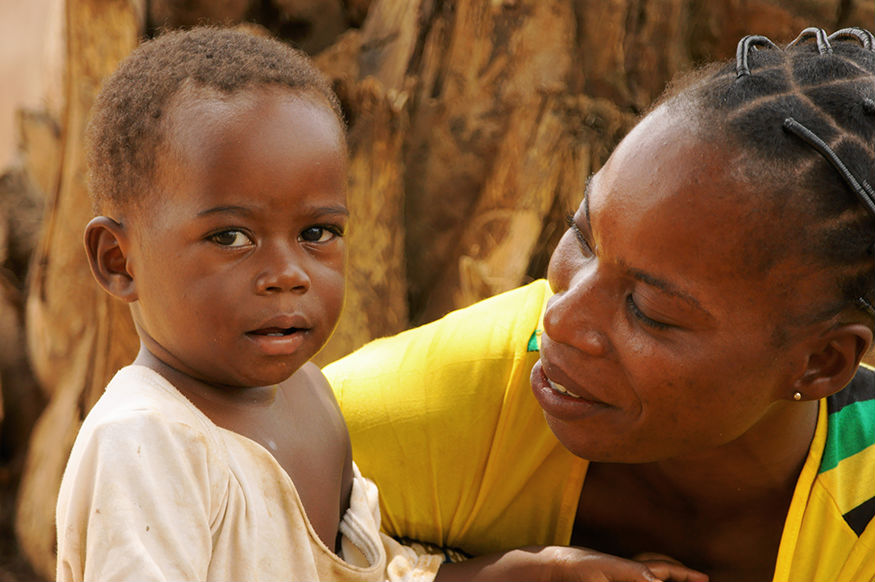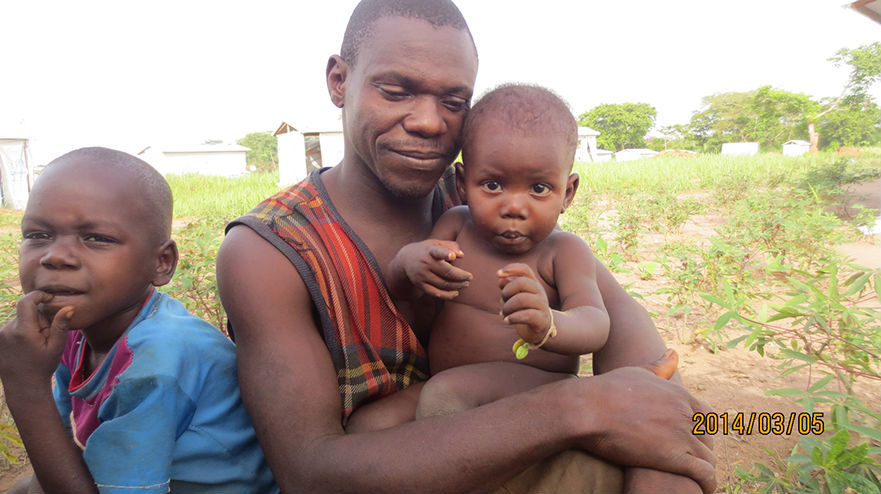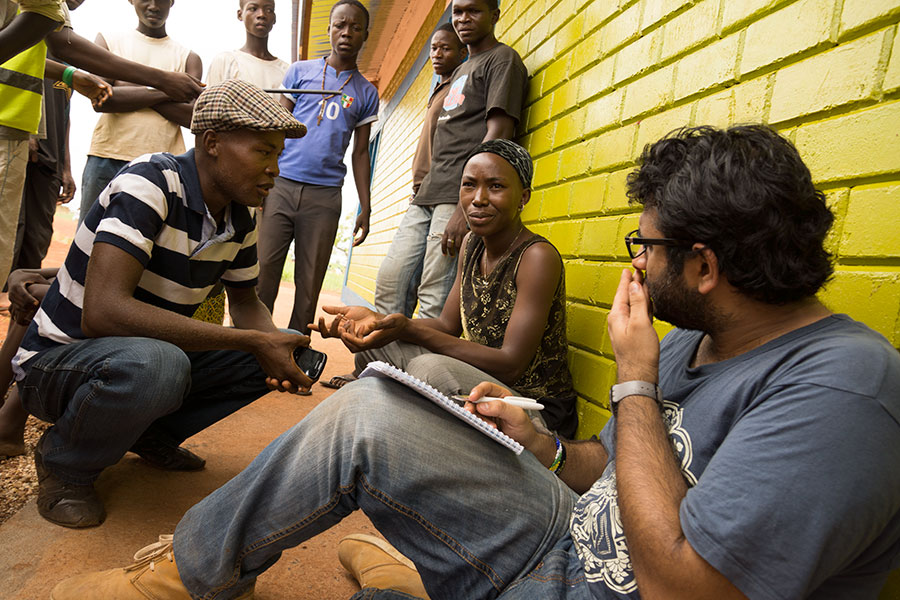The war across the river
FOR TENS OF THOUSANDS OF PEOPLE LOOKING TO ESCAPE THE VICIOUS WAR IN CENTRAL AFRICAN REPUBLIC, CROSSING THE OUBANGI HAS BECOME THE DIFFERENCE BETWEEN LIFE AND DEATH.
The war
The river
No ordinary life
Waiting for God
THE HOSTS
EUNICE DIBA
HENRI NBEGU
THE STUDENTS
No ordinary life
At the heart of this disaster are the lives of ordinary people whose worlds have been turned upside down. Children have lost their parents, farmers are separated from their lands and students sit idly in refugee camps terrified of surrendering their futures.
The hosts
The UN says that being hosted by a local family rather than living in a camp full of strangers helps many refugees to better deal with the trauma they have experienced.
“This cohabitation and normal setting often helps refugees lead as normal a life as possible,” explains Celine Schmitt, the UNHCR's senior regional external relations officer.
Often, where there is continued fear and insecurity, especially when there is a religious or ethnic element to a conflict, many refugees have opted to stay with a host or in a host community, believing this provides an added layer of protection.
The hospitality on show is striking, with many sharing what little they have. Stories abound of local families changing their consumption habits so that the visitors might be able to eat the limited food cultivated on their farms. Living rooms of modest homes have become bedrooms as plastic and straw mats take over the gravel floors to host entire families. Few here suffer selective amnesia; they are too familiar with the ordeal.
lmost half of the 60,000 CAR refugees forced to flee to DRC, now live with host families in the towns of Zongo and Libenge and their surrounding areas. Connections between the communities on either side of the border date back decades and even transcend generations. It is after all just the river separating Zongo and Libenge from the CAR.
Traders in Zongo have opened their homes to their business contacts forced to leave Bangui. Others have welcomed refugees just to demonstrate solidarity with those facing trouble on the other side.
There are many cases of refugees now staying with Congolese families in Zongo and Libenge, whom they once hosted in Bangui during various conflicts in DRC over the past two decades. Now, former refugees have become hosts.
a
ZONGO, DEMOCRATIC REPUBLIC OF CONGO
Most refugees are still shocked by the events on the side of the river

Eunice Diba
or Eunice Diba, the trauma is still fresh. The 18-year-old says she was forced to flee at the beginning of March 2014, after fighting broke out in her district in Bangui. “A Muslim killed a Christian and then Christians started killing Muslims,” she explains.
The fighters started going door-to-door. Her husband fled in one direction, she in another. On the way, she stumbled upon her neighbours’ two children. With the chaos ensuing all around her, Diba says she wasn’t sure if their parents were dead or alive. She took the children with her. After walking to the port in Bangui, she took a boat, paying 1500 CFA, the equivalent of $3, for her own passage.
The boatsmen took pity on her and allowed her to transport her daughter, younger sister and her neighbour’s two children across the border without charge. Once she arrived in Libenge, she started looking for her only friend in the town. It took some time, but when she found Esile Blandine, a 22-year-old Congolese woman who often came to Bangui on business and was herself a refugee in CAR several years before, she found a home.
Blandine says the decision to open her home to her friend was not difficult: “I often went to Bangui and she looked after me there. I had no choice but to take her in. She fled war, after all,” she said.
Diba is now looking after her neighbour’s children, and still has no idea of the whereabouts of their parents.
f
Eunice Diba (left) found a generous host in the form of Esile Blandine, who was herself a refugee in CAR when war hit the Equateur province

enri Nbengu, 35, was shot in the knee by bird shot pellets during a round of fighting between anti-balaka and Seleka militia at the height of tensions in December. “There were bodies everywhere,” he says. “I have never seen anything like it.” He fled with his family and says:
“We took nothing with us because we didn’t think it would last that long.” They first went to Bimba, a town in DRC, and then to Libenge where Nbengu sought out a family who had stayed with his mother-in-law during the 2009-2010 conflict in DRC. He hoped the family, the Mamies, would return the gesture. They did.
Yangunde Mamie says that when they received news that a family from Bangui was looking for them, “We were surprised, but when we found out who they were, we were very happy to host them”. The Mamie family remembered the kindness they had been shown when they spent almost two years living as refugees in CAR.
"When we left, this village was empty, people were also killing with machetes then," Mamie recalls. As part of the repatriation incentives offered to refugees from DRC living in CAR and elsewhere, the UNCHR built new homes for those families willing to return.
When the Mamie family returned, their original house was still standing but the UNHCR built another home for them. It is this second home that the Mamie family offered to the Nbengu family when they arrived.
A month later, the Mamies heard that another person was searching for them. It was 65-year-old Veronique Mbupama, Nbengu’s mother-in-law and the woman who had hosted the Mamies in CAR. Unaware that her daughter and son-in-law had already sought refuge there, locating the Mamies provided even greater comfort than she could have hoped for.
Sitting in the shade of the lush mango and palm trees outside her adopted home, the wrinkled and visibly tired Mbupama explains: “I didn't know where else to go, so I came to find them.”
Henri Nbegu
h
The Mamies unwittingly brought a family together in a war burdened by stories of loss

PATRICK DAMAGUA, 26
The shock of such radically changing circumstances has, according to MSF, left many battling mental health problems. The NGO reports that sleeping disorders, anxiety and other ailments have become more common.
The president of the refugee committee at the Mole camp, Wilfred Pani, says the young adults are proving particularly difficult to manage. “Their predicament poses a threat to the camp, even the host communities outside,” he warns.
Those used to the bustle of CAR’s capital are growing bored and restless. And that, say officials, can be dangerous. The UN has started building a cyber café in an effort to restore a semblance of normalcy for youth cut off from their homeland and the rest of the world.
Their stories:
he Mole refugee camp, on the outskirts of DRC’s Zongo, is now home to some 9,000 refugees from CAR. Profiles of the refugees vary, with rural and urban settlers from different backgrounds and fortunes now living side by side in the camp.
Due to the proximity to Bangui, the capital of CAR, which has seen an outflow of residents since the conflict began in March 2013, there are thousands of urban youth now living in the camp, frustrated at their predicament.
Many were university students before the conflict forced them to flee; they’re now struggling to come to grips with living in the hinterlands of DRC, without electricity, running water or a mobile phone network.
PATRICK N'GOCKO, 25
NGOMA SYLVIANE, 26
ELSA DANPENA, 25
YAOUNE II HELENA, 23
The students
t
PATRICK DAMAGUA
26
Studying for a Bachelor of law
I am here because the Séléka rebels took power. The situation was horrible and I was obliged to come across the river and into DRC. In Bangui, I was a student, living on campus. We had a carefree life.
When I was not studying on the weekends, I would go home to visit my family - my brother and sisters. All of this broke down when the Seleka arrived. We were attacked by the group, and some students were even killed.
My dream was to finish my studies and become a public servant. What am I going to do with my legal interests here? I wanted to get a job, get married and live a normal, peaceful life.
Now, my dreams are destroyed. I am not sure how any of this can happen. Of course, if there is peace back home, I will return.
The biggest frustration being here is that I cannot adjust to this village life, having lived in the city for so long. Here in the open it gets so hot, and all we have is a tent for shelter. There is also nothing to distract us, and I grow more and more disappointed each day.
ELSA DANPENA
25
Studying for a Bachelor of agriculture
I came here because they attacked my house. Everything was destroyed. I try to keep myself busy by doing some gardening.
I decided to study agriculture because it is the basis of the development of a country. I have always been concerned by problems related to food, and I've always wanted to try and make sure that we are not impacted by food insecurity and malnutrition.
CAR has land, and I'm trying to sensitise people to the fact that agriculture is a way to earn a living. And if we don't cultivate, we will one day, maybe, have problems in the country. And now that I am here, I practice whatever little I have studied.
Some people here have never been to the countryside, and they don't know how to cultivate land. Farmers are born into farming, and others are not. I try to pass on my knowledge. The people from the urban areas now living here need to realise that they are now in a different environment. They cannot keep on saying that they are from the city.
They need to be more open and less stubborn, and need to adapt to the environment. There is resistance and they are stubborn. They could go for help to the local NGOs, use the land and to cultivate.
My problem here is that we cannot continue to study. We've lost some years of study already. We hope the UNHCR can help us study somewhere in central Africa.
YAOUNE II HELENA
23
Studying to be a healthcare worker/midwife
First of all, I miss my father the most. I also miss the rest of my family, and I don't know where they are. I've been here since June 2013.
I'm here with my husband, his daughter and his mother. We lived in a little house in Bangui, where I was just getting into my studies to become a midwife.
We were forced to leave because my husband was working for the authorities, when the Séléka took over and they then were looking for him.
The life here in Mole and there in Bangui is completely different. For instance, in Bangui, I remember going shopping in a car. Here, there is nothing. We are in the middle of the grass. The health situation is poor and education facilities do not exist.
The most important thing for me now, is my studies. Right now, I look for fruits to sell, to try and make some money. But I don't want to live in a refugee camp. I cannot bear to live here in the middle of the grass and I am still shocked that this has happened.
NGOMA SYLVIANE
26
Studying for a Bachelors in computer science
I had a good life in Bangui. I was in my third year of computer science studies and I lived with my family. My husband was working and we had running water and electricity. But here, we are living in darkness.
The water here is not too good and we sleep on a mat on the floor. There is nothing here: no Internet, no mobile network, no library.
We are simply isolated here. We don’t know what’s happening around, but I am happy that I am safe here.
PATRICK N'GOCKO
25
Studying for a Masters in American literature
I came here because there is a war in my country. They were looking for the intellectuals in the country to kill them. They were also targeting Christians. I don't know where my father or my mother are right now. I hear my brother is somewhere in DRC, maybe Bado.
I want to be a translator in English, French or Arabic.
My life is different here and I cannot say that I am OK. I get anxious about the future. The lack of education means that we are stagnating. Not progressing anywhere.
I would go to Kinshasa for instance, but I do not have the means to do so.
The bright colours of the (still incomplete) cyber-cafe tell of the aspirations of the youth at the Mole refugee camp

RETURN TO TOP...
...OR CONTINUE TO NEXT CHAPTER



